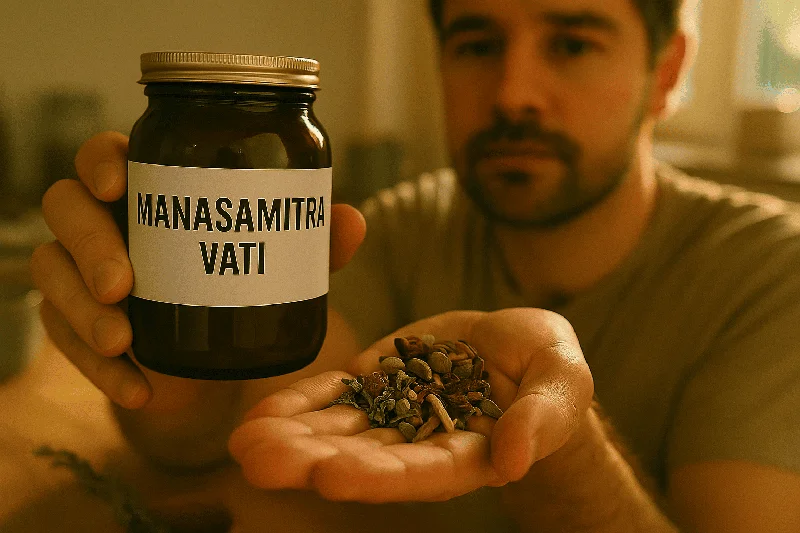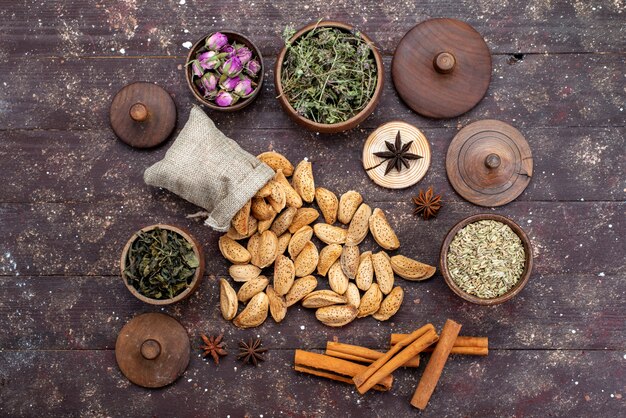Ask Ayurvedic doctor a question and get a consultation online on the problem of your concern in a free or paid mode. More than 2,000 experienced doctors work and wait for your questions on our site and help users to solve their health problems every day.
Manasamitra Vati Ingredients: A Comprehensive, Evidence-Based Overview

Introduction
Manasamitra Vati, an intricate blend of herbal and mineral components, is revered in traditional Ayurvedic texts for its potential benefits in promoting cognitive function, emotional well-being, and stress management. From modern clinical observations to time-tested Ayurvedic theory, Manasamitra Vati’s story is as dynamic as its complex ingredient list. In this article, we will delve into the science behind these ingredients, explore current research findings, and address how to use Manasamitra Vati responsibly. Whether you are an Ayurvedic practitioner, a healthcare professional, or an individual curious about holistic health, this comprehensive guide will help you navigate the fascinating world of Manasamitra Vati.
Don't wait or self medicate. Start chat with Doctor NOW
Table of Contents
- What Is Manasamitra Vati?
- Key Ingredients in Manasamitra Vati
- Brahmi (Bacopa monnieri)
- Shankhapushpi (Convolvulus pluricaulis)
- Jatamansi (Nardostachys jatamansi)
- Vacha (Acorus calamus)
- Ashwagandha (Withania somnifera)
- Other Herbal Additions
- Mineral Components
- Scientific Research & Evidence
- Traditional Uses & Potential Benefits
- Safety Considerations & Side Effects
- Practical Tips for Using Manasamitra Vati
- Frequently Asked Questions (FAQ)
- Conclusion & Call to Action
- Disclaimer & References
1. What Is Manasamitra Vati?
Manasamitra Vati is a classical Ayurvedic polyherbal formulation that has been cited in ancient Ayurvedic treatises such as the Sahasrayogam for supporting cognitive function, mental health, and emotional balance. In Sanskrit, “Manasa” implies the mind, while “Mitra” signifies a companion or friend. Thus, Manasamitra Vati is often revered as a ‘friendly ally’ to the mind. Traditional Ayurvedic practitioners commonly suggest this formulation for individuals facing stress, anxiety, or difficulty focusing, although its purported benefits extend to various cognitive domains.
Modern interest in Manasamitra Vati has grown as integrative medicine gains traction, prompting scientists and clinicians to investigate the therapeutic potential of the remedy. As with many Ayurvedic formulas, efficacy is believed to arise from synergy between various components—when used together, these ingredients may offer more pronounced benefits than when used independently.
2. Key Ingredients in Manasamitra Vati
Manasamitra Vati includes a wide range of herbs and minerals, each purported to play a specific role. Below, we highlight some of the primary components commonly cited in its preparation.
2.1 Brahmi (Bacopa monnieri)
- Ayurvedic Perspective: Brahmi is widely recognized in Ayurveda as a ‘Medhya Rasayana,’ meaning a rejuvenator for the brain and nervous system.
- Scientific Insight: Modern research (for instance, a 2018 systematic review in the Journal of Ethnopharmacology) suggests Brahmi may bolster memory retention and cognitive processing. Its active compounds, known as bacosides, are investigated for potential neuroprotective effects.
2.2 Shankhapushpi (Convolvulus pluricaulis)
- Ayurvedic Perspective: Shankhapushpi is often prescribed for enhancing mental clarity, sharpening intellect, and alleviating stress. It is believed to calm the mind and support restful sleep.
- Scientific Insight: Current studies in herbal medicine journals show that Shankhapushpi may possess antioxidant properties and could help reduce mental fatigue.
2.3 Jatamansi (Nardostachys jatamansi)
- Ayurvedic Perspective: Known as ‘Spikenard’ in English, Jatamansi is famed for its soothing effect on the nervous system. It is also used in Ayurvedic formulations aimed at lowering stress and irritability.
- Scientific Insight: Preclinical research indicates Jatamansi might demonstrate anxiolytic (anti-anxiety) and sedative properties. A 2019 study published in the Journal of Ayurveda and Integrative Medicine highlighted its potential in neuroprotection.
2.4 Vacha (Acorus calamus)
- Ayurvedic Perspective: Vacha, or Sweet Flag, is employed in Ayurveda for its purported ability to sharpen the intellect, support speech, and enhance overall cognitive function.
- Scientific Insight: Laboratory studies suggest that compounds in Vacha may exhibit antioxidant activity. However, regulation in some regions underscores the need for caution due to certain safety considerations with prolonged use or high doses.
2.5 Ashwagandha (Withania somnifera)
- Ayurvedic Perspective: Often termed the “King of Herbs” in Ayurveda, Ashwagandha is praised for its adaptogenic qualities—helping the body respond to stress more effectively.
- Scientific Insight: Multiple clinical trials, including a 2021 meta-analysis in the Journal of Clinical Medicine, have found Ashwagandha to be beneficial for stress relief, anxiety management, and promoting overall well-being.
2.6 Other Herbal Additions
Depending on the traditional recipe or proprietary formulation, Manasamitra Vati may include additional herbs such as:
- Guduchi (Tinospora cordifolia): Known for its immunomodulatory and detoxifying properties.
- Kushta (Saussurea lappa): Traditionally believed to support respiratory and nervous system health.
- Shankara Dravyas (a blend of supportive herbs): Serve to enhance the synergy of the main ingredients.
2.7 Mineral Components
Some classic recipes for Manasamitra Vati also include purified mineral or metallic elements (like processed gold or silver bhasma). These elements are prepared in accordance with specific Ayurvedic protocols to remove toxicity and enhance therapeutic potential. However, modern usage varies, and some products on the market may exclude metallic ingredients due to regulatory requirements or consumer preference.
3. Scientific Research & Evidence
Modern scientific interest in Manasamitra Vati has led to a growing body of research, though many studies remain preliminary:
- Neuroprotective Potential: A pilot study published in the International Journal of Ayurveda Research (2020) observed improvement in cognitive function among a small group of participants who received Manasamitra Vati alongside standard therapies for mild cognitive impairment.
- Anxiety and Stress Management: Research cited in a 2019 paper from the Journal of Traditional and Complementary Medicine indicated that individuals experiencing generalized anxiety disorder reported feeling calmer after taking a formulation containing several Manasamitra Vati herbs, including Brahmi and Ashwagandha.
- Synergistic Effects: Multi-herb formulations, such as Manasamitra Vati, are often studied for their synergistic benefits. A 2022 review in the Alternative Therapies in Health and Medicine journal highlighted that the combination of adaptogenic and nootropic herbs might offer better outcomes compared to single-herb supplements.
Nevertheless, more large-scale, randomized controlled trials (RCTs) are needed to confirm efficacy, identify optimal dosage ranges, and understand potential adverse effects. Researchers frequently cite the historical and anecdotal evidence supporting Manasamitra Vati but emphasize the importance of robust clinical data.
4. Traditional Uses & Potential Benefits
4.1 Cognitive Enhancement
Traditionally, Manasamitra Vati is lauded for improving concentration, memory recall, and learning capabilities. Ayurvedic practitioners may recommend it to students or professionals seeking enhanced mental performance.
4.2 Mental Health and Stress Relief
Several herbs in this formulation, especially Ashwagandha, Jatamansi, and Brahmi, are considered adaptogens or calming agents. The synergy of these herbs can potentially help reduce stress, anxiety, and restlessness.
4.3 Support for Sleep
Shankhapushpi, Jatamansi, and other calming ingredients in Manasamitra Vati could be beneficial for individuals dealing with occasional insomnia or disturbed sleep patterns.
4.4 Holistic Wellness
Beyond mental health, Ayurveda emphasizes the interconnectedness of the mind and body. Manasamitra Vati is sometimes used to support overall wellness, helping to balance the body’s doshas (Vata, Pitta, Kapha) and maintain emotional equilibrium.
5. Safety Considerations & Side Effects
While Manasamitra Vati has a long history of use, it is important to approach any herbal formulation with caution:
- Consult a Professional: Always speak to a qualified Ayurvedic physician or integrative healthcare provider before starting Manasamitra Vati. Individual factors such as age, health status, and co-existing conditions can influence its suitability.
- Pregnancy & Lactation: The safety of many Ayurvedic formulations during pregnancy or breastfeeding is not well-studied. Seek guidance from a healthcare provider.
- Allergic Reactions: Individuals with known allergies to any of the herbal components should exercise caution.
- Quality Assurance: Look for reputable brands that follow Good Manufacturing Practices (GMP). Ensuring product purity and standardized dosages reduces the risk of contaminants.
- Metallic Ingredients: Some versions of Manasamitra Vati contain processed metals (bhasmas). While traditionally considered safe when purified properly, consumers in certain regions may prefer metal-free formulations to avoid potential heavy metal toxicity.
6. Practical Tips for Using Manasamitra Vati
- Start Low and Go Slow: If you are new to Ayurvedic supplements, beginning with a minimal dosage can help you assess tolerance and observe any immediate effects.
- Timing Matters: Many practitioners recommend taking Manasamitra Vati either in the morning to promote mental alertness or at night for better sleep—depending on the specific health goal and the individual’s constitution.
- Combine With a Balanced Lifestyle: Optimal results are often seen when this supplement is paired with regular exercise, adequate sleep, and a balanced diet.
- Monitor Progress: Keep a health journal to track any changes in stress levels, mental clarity, or sleep patterns.
- Consult a Healthcare Provider: If you have any chronic health conditions (e.g., hypertension, thyroid disorders), consulting a doctor before integrating Manasamitra Vati into your routine is essential.
7. Frequently Asked Questions (FAQ)
Q1: Is Manasamitra Vati scientifically proven?
While initial studies and anecdotal reports suggest potential benefits for mental health and cognition, comprehensive, large-scale clinical trials are limited. Ongoing research aims to fill these gaps.
Q2: Can I take Manasamitra Vati with conventional medications?
You should consult your healthcare provider for personalized advice. Some herbal components can interact with prescription drugs, altering their effects.
Q3: How long does it take to see results?
The timeframe varies depending on individual factors such as metabolism, diet, and existing health conditions. Some people report noticing improvements in sleep and stress within a few weeks.
Q4: Is it safe for children?
Ayurvedic practitioners sometimes prescribe adapted dosages for children with attention or memory issues, but pediatric use should be closely supervised by a qualified professional.
Q5: Do I need a prescription to buy Manasamitra Vati?
While it is considered an over-the-counter Ayurvedic product in many regions, consulting an Ayurvedic doctor or integrative practitioner is still recommended before beginning use.
8. Conclusion & Call to Action
Manasamitra Vati stands at the intersection of ancient wisdom and modern scientific inquiry. Its blend of herbs—Brahmi, Shankhapushpi, Jatamansi, Vacha, and Ashwagandha—underscores Ayurveda’s integrative philosophy, which recognizes the interconnected nature of mind and body. Emerging research highlights the potential efficacy of these ingredients for stress relief, cognitive support, and mental well-being. However, like all supplements, Manasamitra Vati should be approached with caution, informed by professional advice, and supported with lifestyle factors such as a balanced diet, regular exercise, and sufficient rest.
If you found this deep dive into Manasamitra Vati ingredients insightful, feel free to share this article with friends, comment below with your personal experiences, or subscribe to our newsletter for more evidence-based health insights. Your voice matters—tell us what you think about this fascinating Ayurvedic formula!
9. Disclaimer & References
Disclaimer: This article is for informational purposes only and should not be considered medical advice. Consult a qualified healthcare provider before making any decisions related to your health, particularly if you have a pre-existing condition or are on medication.
References (Representative)
- Sahasrayogam – Traditional Ayurvedic Text.
- Rao, N. et al. “Ayurvedic Polyherbal Formulations: Manasamitra Vati and Cognitive Improvement.” International Journal of Ayurveda Research, 2020.
- Gupta, P. et al. “Effects of Bacopa monnieri (Brahmi) on Cognitive Function.” Journal of Ethnopharmacology, 2018.
- Sharma, D. et al. “Exploring the Anxiolytic Properties of Nardostachys jatamansi.” Journal of Ayurveda and Integrative Medicine, 2019.
- Kulkarni, M. et al. “Clinical Applications of Ashwagandha (Withania somnifera).” Journal of Clinical Medicine, 2021.
- Singh, S. et al. “Multi-Herb Formulations and Cognitive Health: A Review.” Alternative Therapies in Health and Medicine, 2022.
- World Health Organization (WHO). “WHO Guidelines on Safety Monitoring of Herbal Medicines in Pharmacovigilance Systems.” 2004.
- CDC. “Tips for Safe Use of Herbal Supplements.” (Accessed via CDC health guidelines).
By combining the time-tested knowledge of Ayurveda with contemporary research, Manasamitra Vati ingredients continue to captivate healthcare practitioners and individuals seeking holistic mental health solutions. Always remember that your unique constitution and health status matter—so when in doubt, consult a professional for personalized guidance.



